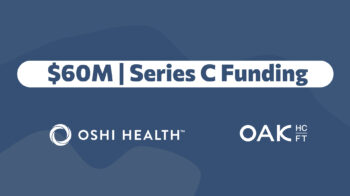Investors share strong viewpoints for wake-up calls in healthcare

Oshi Health is supported by a group of investors who individually and collectively are ushering in the future of healthcare delivery in the U.S. They have the pulse of the healthcare industry, the needs of its stakeholders, and our biggest issues as a country. We asked them for their candid perspectives. Not surprisingly, they have a lot to say:
Senator Bill Frist, M.D., Frist Cressey Ventures Co-Founder: “For too long, medicine has been focused primarily on sick care and treating patients only after their symptoms necessitate intervention. Especially when it comes to chronic diseases and symptoms, this type of system is often expensive and inefficient, leaving many patients unable to find balance between managing their daily lives and well-being. Oshi Health is sounding the alarm and paving the way for a much-needed healthcare revolution that emphasizes accessible and comprehensive value-based care, giving patients agency over their health and granting them access to the right tools to do so.
There is much the rest of the healthcare industry can learn from the Oshi Health model, which capitalizes on the benefits of telehealth to alleviate some of the burden on patients and connect them with a wide range of specialists under one umbrella. The Oshi Health platform prioritizes virtual, preventative care and allows healthcare professionals and patients to make coordinated changes to avoid expensive emergent care. This is a transition not only to value-based care but to care that is comprehensive and multidisciplinary, keeping the cost for gastroenterological treatments low and the quality of care high. Oshi Health is propelling the healthcare industry toward a new norm — one that is patient-first, accessible, comprehensive, and affordable.”
Navid Farzad, Frist Cressey Ventures Partner: “We have a provider shortage problem in healthcare that is pervasive and growing. We won’t be able to create enough new labor hours to keep up with demand so we have to figure out how to do more with less. Oshi Health’s ability to provide tech-enabled, multidisciplinary care to those with chronic GI conditions brings high quality, customized care to patients who are desperate for it. Furthermore, by collaborating with GI practices to serve these patients, Oshi Health also allows the practice to increase their acuity mix and focus on those patients in need of procedures and in-person visits. It’s a win for the payor, provider and, most importantly, the patient.”
Michael Greeley, Flare Capital Partners: “Gastrointestinal conditions are a quiet yet significant epidemic in our country — representing enormous spend and totally unsatisfactory care. Digestive diseases account for over 100 million ambulatory care visits annually in the U.S. — up from 48 million just a decade ago. That’s an astonishing growth in utilization and costs.
We are hearing payers and employers now realizing that GI is one of the most expensive specialties. There is strong evidence for integrated, specialized GI therapies that change the trajectory of individuals’ chronic symptoms, and in turn, improve patients’ quality of life and health care purchasers’ economics.
Redesigning a category of specialty care is a massive undertaking because it requires challenging layers of entrenched processes, incentives and institutions. Yet consumers and purchasers are demanding change, expecting better. And we are living in a time of unparalleled innovation and reinvention in healthcare.”
Steve Kraus, Partner, Bessemer Venture Partners: “One of the largest cost drivers in healthcare is spend associated with gastrointestinal disorders. It manifests through specialty drug spend, repeated ER visits, unnecessary scopes, and lower workplace productivity and impairment. As a result, health plans and employers are starting to look for care options. Oshi offers an integrative model to support GI patients across every step of their journey, whereas before, it was such a disparate and dissatisfying experience.”
Josh Flum, Chief Strategy and Business Development Officer, CVS Health: “Oshi Health’s pioneering GI care delivery model provides a view into the future of health care in America — care that is effective and empowering, delivered with convenience. CVS Health Venture’s investment can help Oshi Health with their mission to increase access to consumer centric health care for the many Americans living with GI conditions.”
Bruce Meadows, Takeda Digital Ventures: “Gastrointestinal (GI) patients have struggled to receive the right care at the right time. They face long wait times for appointments. They often get an inconclusive diagnosis. They have to work through referrals to dietary specialists and many registered dietitians don’t take insurance. Specialized diets are hard to figure out. Coordinating their own care is complicated and taxing, and many give up on preventive care.
We’ve been listening to these patients which is why we created the world’s first full stack virtual-first clinic for GI patients. Through Oshi Health, patients are cared for by a team that helps them understand their conditions and achieve sustainable symptom control, led by board certified Gastroenterologists to deliver excellent and prompt clinical care.”
Eric M. Stone, Founder & CEO, Velano Vascular; Serial Entrepreneur; Former National Trustee, Crohn’s and Colitis Foundation: “I was misdiagnosed as a teenager, at a time when Crohn’s Disease wasn’t well understood. The ‘unknown’ closed down my world for years, at an age I should have been my most active. We haven’t made enough progress since then: Diagnosis has gotten a little better, but it’s still hard for people to manage symptoms and understand food triggers and learn anxiety management techniques and adapt lifestyle choices.
What I know from living with IBD is that I have a lot of company. When I talk about my personal story living with a gastrointestinal disorder, people open up about their own chronic symptoms or family members’ journeys and struggles with GI health. GI conditions are shockingly prevalent, and not at all well-managed. What’s worse — societal stigma keep these shared experiences hidden. This is unacceptable at a human level, and the costs are unsustainable.
I’ve been tackling problems worth solving in healthcare as my life’s work — to truly understand our audiences and what they need, to build a market and to drive meaningful change for the better. This is exactly what Oshi Health is doing. Supporting their vision and care model is both entrepreneurial and intensely personal.”
Russell Glass, CEO of Headspace Health: “We’re in the early days of understanding how many dimensions of health and wellbeing are influenced by the mind-body connection. This simple concept is critical to whole-person care and it needs to be universally accessible and affordable. The good news is we now have the proven care delivery means and models that truly scale, but to drive the change we all want to see, we need to focus on topics that have long been stigmatized. Although there is still work to do, talking about our mental health has come a long way — we need to talk about digestive health with the same urgency and begin to act on the mind-body connection for everyone.”


